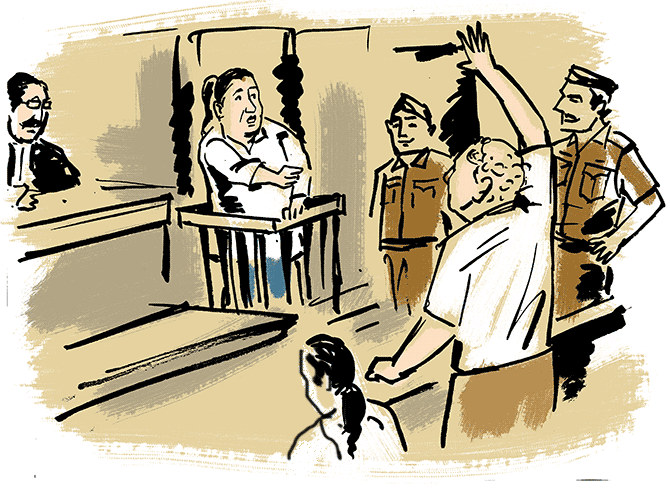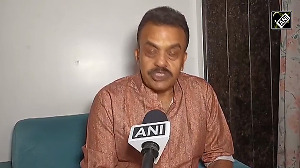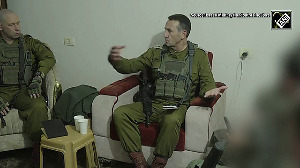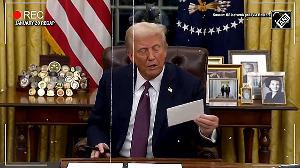'I returned to jail at 4.45. I was body searched and sent back to my cell.'
'A bowl of dal was kept there covered.'
'Another guard gave me a tablet and I became unconscious.'
Accused One spoke about a similar incident happening to her in October 2015 and also with a bowl of dal.
Vaihayasi Pande Daniel reports from the Sheena Bora trial.
Illustration and animation: Dominic Xavier/Rediff.com

Plenty was spoken in court on Monday, April 23, at the Sheena Bora murder trial.
Volumes.
Between Kajal Sharma* and Kavita Patil*.
Between Judge Jayendra Chandrasen Jagdale* and Kajal Sharma.
Between Sharma and Sudeep Pasbola*.
Between Kavita Patil and Pasbola.
Between Judge Jagdale and Patil.
Between Gunjan Mangla* and Judge Jagdale.
Between Pasbola and Bharat Badami*.
Between Indrani Mukerjea and Judge Jagdale.
But much more was conveyed through a few unspoken moments at Courtroom No 51 at the Mumbai city civil and sessions court.
Like how the courtroom suddenly developed a crisp, office-like, atmosphere when, standing in the witness box, Kajal Sharma, Indrani Mukerjea's former assistant, began to carefully check receipts, deposit slips, letters and documents.
You knew a secretary was deposing evidence because of the methodical and efficient way in which Sharma inspected each piece of paper shown to her by Special Public Prosecutor Kavita Patil.
The caution and thoroughness, with which she did so, also gave you a good sense of why Indrani kept Sharma on her staff for so many years.
Or like the wretched discomfort, that hung silently in the air, when Sudeep Pasbola, Indrani's lawyer, asked Sharma, over and over again, that didn't she think forging Sheena's signature and opening an e-mail account in the then dead girl's name was wrong.
Or like that peculiar moment at the end of Sharma's deposition of evidence, when she was asked by Patil to identify Accused 1 Indrani Mukerjea and Accused 4 Peter Mukerjea.
In slow motion Sharma's head swivelled clock-wise, her eyes roving carefully around the room, from left to right.
They alighted on Peter and lit up. With an outstretched arm, she pointed him out, exclaiming, "Peter Sir."
Peter, who was standing in the accused enclosure at the back, waved at her.
Then she identified Indrani, who seemed unaware, unusually, of the exercise in progress and was sitting between Peter and Sanjeev, her head bent over, looking at her papers.
Again Sharma pointed.
Indrani looked up and gave a sort of half wave.
Sharma and Indrani first looked guardedly at each other and then each of their faces broke into rather warm smiles.
The oddness of this identification process -- more like a fan greeting two stars, rather than a witness pointing out the accused in a murder case -- must have been reflected on Special Public Prosecutor Bharat Badami's face.
CBI Special Judge Jagdale chided him with a grin, "Kya Badami Sahib, the world is changing," and said something to the effect that things were not what they were like 40 years ago.
Kajal Sharma's second day in the witness box began as expected.
Patil, wearing a black-and-white-patterned sari, continued from where she had left off with Indrani's former personal assistant on April 18, when the evidence dwelt on the resignation letter Sharma signed for Sheena and sent in to Mumbai Metro One (where Sheena had worked), on instructions received from Indrani, by telephone and e-mail, from Britain:
Patil: "Sheena ke naam mein pe, jo Mumbai Metro ko resignation letter likha tha, dekhenge toh pahchanege? (Will you be able to recognise the resignation letter you wrote to Mumbai Metro in Sheena's name?)"
Sharma: "Ji (Yes)."
The two court lady clerks, always starchily efficient, you note admiringly, in spite of the odds, and in total control of the vast kingdom of legal papers, wrapped in a series of red cloth bundles, they rule, pulled out a sheet of white paper.
Sharma examined it closely. She confirmed it was the resignation letter.
Patil: "Yahi hai woh letter? (Is that that letter?)"
Sharma, in a short white kurti, blue jeans, those black pointed flats and a dot of sindhoor in her hair, studying every corner of the paper in the file for a good two minutes, slowly and with certainty said: "Ha (Yes)."
Patil: "Sign kisne kiya? (Who signed it?)"
Sharma: "Mein ne kiya (I did)."
Judge Jagdale: "What kind of document is it?"
Sharma: "Resignation letter."
Patil: "Kis naam se? (In whose name?)"
Sharma: "S Bora."
Patil: "Kiske behalf kiska signature? (On whose behalf whose signature?)"
Sharma: "Sheena Bora."
Patil: "Who has prepared this letter?"
Sharma: "I had taken the printout. The matter was prepared by Indrani."
Patil asked for the envelope of the letter.
The clerks fished it out and presented it to Sharma.
Sharma: "Mera handwriting nahin hai. Shayad Pradeep (Waghmare, office boy at INX Media) ka hai (It is not my handwriting. Maybe it is Pradeep's)."
The 'termination of leave and license' letter was produced, that Sharma also signed on Sheena's behalf and handed over in 2012 to the Mukerjeas' then driver Shyamvar Pinturam Rai, to be taken to the landlord of the flat Sheena had rented.
That letter too she perused intently and said it was the paper given to Rai.
After a pause, examining the paper again and again, she declared: "Excuse me, but yeh xerox hai (This is a xerox/photocopy). This is not an original."
Patil then requested the judge that she would ask Sharma to go through the document once more, since she was saying it was a photocopy.
She started asking in a roundabout way a question -- "Are you in a position..." -- about the document that Sharma had said was not an original.
Pasbola sharply cut her short and took objection, stating that could not be asked of the witness.
Judge Jagdale, mediating, inserted: "She (Sharma) has her own mind."
Patil abandoned that line of questioning and began to ask the secretary about the pen drive and laptop she had been using from INX Media and what happened to it.
Sharma said she had handed it over to the police at the Khar police station, north west Mumbai.
Patil moved to the next document she wanted to show Sharma: "Yeh paper dekho. Aapka sign hai? (See this paper. Does it have your signature?)"
Pasbola got to his feet and in a reasonable tone said, "Again I have to object. The document is being thrust on the witness... You can't just put a document in her hand. That is leading the evidence... Don't surprise her the way you have been surprising her."
Patil denied Pasbola's accusation. She started introducing a sequence of further documents. Some were paying-in slips to banks. Others were payment receipts and then a receipt from a courier company, through which the resignation letter was sent.
A series of questions were put to Sharma, by Patil, about how money was deposited into Rai's account, whose signatures were on the slips, how could she recognise Indrani's signature, how much money was sent to the company where Rai booked cars from and when and so on.
Sharma identified that most of the slips were signed by Waghmare, who usually took the cheques to the bank. The cheques were signed by Indrani.
Judge Jagdale took time out to patiently, and sometimes irritably, school Sharma on how to answer questions put to her in the witness box.
Unlike the earlier two witnesses -- police Sub-Inspector Ganesh Dalvi and Rai, who were allowed to get away with not replying or monosyllabic answers -- the judge was particular in having Sharma supply complete answers:
"You have to answer the question. See you have to explain and speak up" was Judge Jagdale's constant refrain to her, in the same or similar words.
Sharma would look solemnly at him, like an earnest pupil and rephrase her answer, keen to get it right.
A man in a white striped shirt and black jeans, who was likely her husband, sat in the first row of the courtroom, absorbedly listening to her statement to the court, his face showing no expression.
Patil continued with a line of questioning, about the documents she was having put into Sharma's hands, that irked Pasbola further and further, till he finally had had enough.
On his feet in righteous anger to Patil and the judge: "You can't lead the evidence regarding the contents of a document! This document is yet to be proved. You can't lead the contents of a document. Let us take it seriously. This is not the way!"
A fiery argument followed about the legal procedure of presenting a document to a witness and what questions could be asked of the witness about the document.
Pasbola laboured on about how only two questions could be asked since the document had not been proved.
Judge Jagdale looked at him in amazement, not always agreeing with Pasbola, but firmly told Patil a thing or two about the rules of evidence.
"The contents of the documents cannot be proved by oral evidence."
He was exasperated too when Patil introduced that courier receipt and supported Pasbola's contention that it was "someone else's document" and didn't concern Sharma, although the judge added drolly that what Patil was doing was actually beneficial to the defence, since the secretary was an authentic witness.
Towards the end of her deposition of evidence on Monday, Sharma spoke about the winding down of affairs at INX Media.
"November-December 2012 Indrani bolee Shyam ko nikaal dena hai, Shyam ko chodna padega (In November-December 2012 Indrani said Shyam has to go, he has to leave)."
Sharma explained that Indrani said there was not enough work to justify keeping him on as a driver.
She asked Sharma to inform Rai that he had to leave and that she could help him get another job with Star Protection Pvt Ltd run by Samir Buddha, a friend of the Mukerjeas.
Sharma: "Shyam bola nahin, aur woh gaav (Danwa, MP) jaana pasand karenge. Uske bad business down ho gaya... May 2015 mein Indrani saare saaman garage (at the Marlow building where the Mukerjeas had a flat in Worli, south central Mumbai) mein daalne ko kaha. Shift kar diya (Shyam said no. He said he preferred going home to his village. Business at INX Media was down. In May 2015 he told me to shift all the office material to the garage. It was shifted)."
Patil: "Aage kya hua? (What happened next?)"
Sharma recounted that in 2015 she heard about Indrani's arrest and she added: "Mein beech mein news mein padha, in 2016, ki Peter Sir ne mere baare mein kaha (that I spoke to him on the phone, posing as Sheena, and said to him) 'Hi Jiju, I am okay'. Jab mein yeh news padha mujhe galat laga. Mein hamesha Peter Sir ko Peter Sir address karti hu. Indrani ne kabhi us se didi bulane ko nahin kahi. Indrani ne humein kabhi instructions nahin diya ki Peter Sir ko Jiju bolne ke liye. Mein hamesha unko Peter Sir kehte the (I read in the newspaper that Peter Sir, in 2016, said I called him and said 'Jiju, I am okay'. When I read this I thought this was wrong. I always called Peter Sir as Peter Sir. Indrani never asked me to call her didi and she never gave me instructions to call Peter jiju. I always called him Peter Sir)."
As a colleague pointed out, Sharma in her testimony wavered between referring to Indrani as usko or unko, but the respectful unko was reserved for Peter.
"Jab mein yeh news mein padhi shock laga wrong bhi laga. Mein CBI ki office mein gayi bolne ke liye (When I read this in the news I was shocked and I felt it was wrong. I decided to visit the CBI office to tell them)," Sharma concluded, leaving many in the courtroom puzzling over why a young woman, no matter how brave, would volunteer to tell the formidable CBI this somewhat innocuous information.
After Sharma identified the accused, it was time for the defence to begin her cross-examination.
Judge Jagdale to Sharma gently: "Yeh aap ko question puchenge. Indrani ka advocate hai. Agar question nahin samjha (then ask him to repeat/rephrase it)."
Pasbola, in a mock -- or maybe not mock -- warning said with a smile: "Agar aapko question samajh nahin aaya toh (only if you don't understand the question)..."
Indrani's lawyer began by attacking the last part of Sharma's testimony -- about what she had read in the newspaper about Peter that led her to visit the CBI's Mumbai office.
He wanted to know the date of the newspaper in which she read the article and which newspaper and to which CBI officer she spoke to.
Pasbola's tone was not nasty, but not pleasant either.
In response Sharma, who would look Pasbola in the face, was no longer speaking gently or softly and her "nahins" were loud and mildly annoyed, before Pasbola's offence had even begun.
Some of her confidence eroded, her sangfroid slipped a bit, and she often looked down, her hands clutching the railing, but Sharma generally succeeded in keeping it together, in the face of Pasbola's initial onslaught.
Pointing to CBI Investigating Officer K K Singh, Pasbola enquired: "Yehi officer ko mila tha? (Did you meet this officer?)"
Sharma turned around and looked at Singh squarely and said: "Ji (Yes)."
Singh didn't wave, like the accused had, not ten minutes earlier, but gave his usual thoughtful half-smile that is not a smile exactly.
Judge Jagdale quipped: "Now he is useful for cross examination."
Pasbola dourly: "Has to."
Sharma initially insisted she could not remember the exact date in which she read the Hi-Jiju-I-am-Okay article on Peter.
Sharma: "Ninth ke aas paas (Around the 9th)."
Pasbola: "Kitni paper minimum padti ho? (How many papers do you read minimum?)"
Sharma: "I get Times of India, Hindustan Times and Mumbai Mirror at home. I read it in these three or in at least two of them."
Pasbola quizzically, "Local newspapers?"
Sharma agreed, "Yeh sab local newspapers hai (Yes, these are local newspapers)."
Then Pasbola slowly closed in for the kill, suggesting softly to Sharma that she did not approach the CBI and it was the other way round.
Sharma belligerently: "Nahin mein khud se gayi hu (No, I went there myself)."
Attempting to call her bluff, Pasbola wanted to know how many days after reading the newspaper article did she go to the CBI office.
Sharma was vague."Thoda der ke baad (A few days later). I don't remember the date."
Pasbola tried to pin her down: "I am asking approximately."
Sharma offered tentatively: "Ek mahina ke andar (Within a month)."
Pasbola repeating satisfied: "Ek mahina ke andar (Within a month)."
The lawyer wanted to know why she decided to approach the CBI, when she read something she considered erroneous in the newspapers. Why didn't she think of writing to the newspapers?
Sharma, disdainfully: "Us taraf dhyan hi nahin gaya (I didn't even consider it)."
Had she spoken to any press people? Again, Sharma said no, adding: "Ek-aad baar phone aaya. Mein entertain hi nahin kiya (A couple of a call came in, but I didn't entertain them)."
There was a back and forth -- a probably deliberately tangled Q and A -- between Pasbola and Sharma about her statement to the magistrate and if she had been asked to give it or gave it on her own.
Pasbola then went to his main question of the day: "Yeh jo kaam kiya, forgery Yeh dono galat kaam kiya. Galat kam hai barabar? (This job you did, forgery, both of them were wrong. Are they not wrong?)"
Sharma looked pained, "See woh situation alagh thi (It was a different situation)."
Pasbola cut her off, saying he just sought an answer to his question.
Sharma attempted to begin again, unhappily, the burden of what she did six years ago still weighing heavily on her mind, it would seem: "Situation alag thi. Mein good faith mein kiya. It was not about either property or paisa. I could never have even dreamed someone was doing this to their sister. Mein good faith mein kiya. Compulsion tha boss ka... (It was a different situation. I did it in good faith. It was not about land or money so I did it. I did it in good faith and because of the compulsion of a boss)."
Continuing after a pause, she added with some angst: Jab yeh sab patta chala, Sir then I knew ki yeh kaam galat hai. Yes sir, galat hai. I tried to disagree with her. Ek taraf boss urgent pressure dal rahi thi. Compulsion. And it did not involve money or property. Good faith mein kiya. Option nahin tha (When the whole matter emerged I knew I had done something wrong. Yes sir, it was wrong. I did try to disagree with her. On one hand it was the pressure put by a boss and the other hand I did it in good faith. I had no other option)."
Pasbola quipped: "A boss is boss."
That was where Pasbola’s cross examination ended on Monday. It resumes again on Tuesday.
Badami gestured for Sharma to exit the witness stand. The former secretary headed to a chair that the tall bespectacled man, who was probably her husband, vacated for her. She sank into it gratefully and had some sips of water.
Then began the now-established routine of Peter taking permission from the judge to eat the lunch his sister Shangon Das Gupta had brought, at the back of the courtroom.
Sanjeev, newly returned from hospital, got the judge's assent, via his lawyer, to meet his brother who had come from Bengaluru.
Sharma, who was still sitting in court, turned around curiously to look at the various knots of people around each of the accused.
Indrani, wearing all white, her numerous police escort tailing her, approached the witness stand.
She stepped in, and looking distraught, addressed the judge in an agitated manner: "On April 6 I was brought to court. I would like to say that while I was in court I didn't eat anything or drink anything and nobody gave me anything to eat. I was fasting. I only met my three lawyers..."
"I returned to jail at 4.45. I met the superintendent. I was body searched and sent back to my cell. A bowl of dal was kept there covered."
"I had a bath, said my prayers. It was 5.20. I looked at the time because I had to break my fast. Another guard brought another slip of paper and gave me a tablet and I became unconscious."
Accused One spoke about a similar incident happening to her in October 2015 and also with a bowl of dal.
Indrani continued, disturbed, distrait, her eloquent eyes large in her face, the sindoor in the parting of her hair noticeable: "Sir, I fear for my life. There is a threat to my life. Someone is trying to kill me. I cannot deal with this (if it happens) a third time."
"I am constantly looking over my shoulder wondering what is going to happen next."
In a low tone, not audible to the room, the judge seemed to be assuring her and perhaps calmed her down.
Since Indrani's recent bout of hospitalisation, the trio have spent much less time on the court premises. Each of the accused spend maybe 15 minutes or so with their lawyers and relatives before heading back to jail.
*PW 3, prosecution witness No 3 and former INX Media secretary, Kajal Sharma; Special Public Prosecutor Kavita Patil; CBI Special Judge Jayendra Chandrasen Jagdale; Indrani's trial lawyer Sudeep Pasbola; Indrani's lawyer Gunjan Mangla; Special Public Prosecutor Bharat Badami; Accused One and Sheena Bora's mother Indrani Mukerjea.
- MUST READ: The Sheena Bora Murder Trial











 © 2025
© 2025